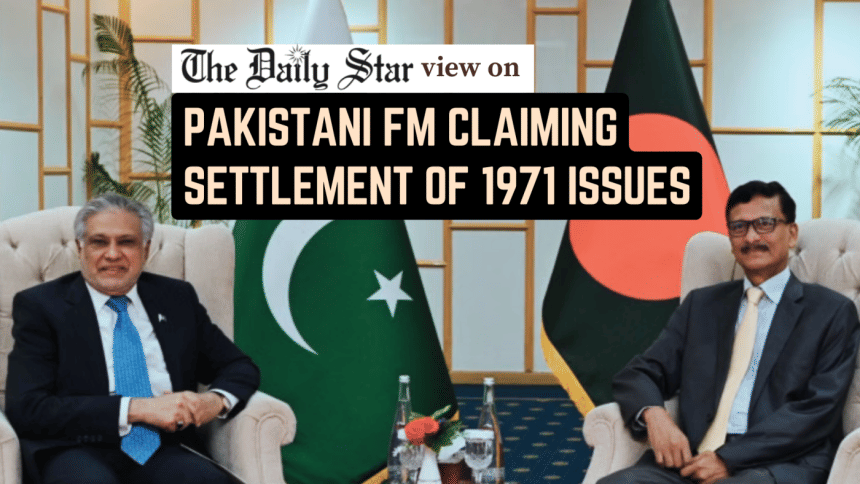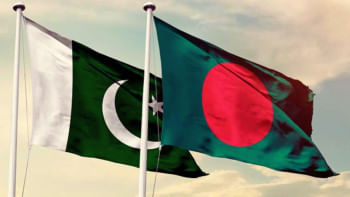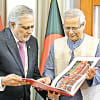No, the 1971 issues haven't been resolved

We disagree with Pakistani Foreign Minister Ishaq Dar's assertion that the 1971 issues stand resolved between Bangladesh and Pakistan. Speaking to journalists after a meeting with Foreign Adviser Touhid Hossain on the final day of his two-day visit, he claimed that the matter was settled once in 1974 and again in the early 2000s during then-president Pervez Musharraf's visit to Bangladesh. The truth couldn't be further from that. We do not know where Mr Dar was getting his facts from, but history and media reporting over the years show a constant pattern of Pakistani authorities ignoring demands for an official acknowledgement and apology for the 1971 genocide, the repatriation of stranded Pakistanis or "Biharis," or Bangladesh's rightful share of pre-1971 assets. That official messaging from Pakistan should still rely on evasion is quite painful to see, especially as the two countries embark on a new era of bilateral relations.
Even if we leave aside the question of factual corroborations, an apology for atrocities committed against a nation should be apologetic enough to convince. It shouldn't cause further consternation. That said, Mr Dar's apparent reference to the 1974 Tripartite Agreement signed in New Delhi deserves to be read within the right context. The agreement was hailed at the time as an act of reconciliation in a sharply divided subcontinent. But it also left crucial issues unresolved. Bangladesh, under pressure from India and Pakistan, released 195 senior Pakistani officers accused of war crimes on Islamabad's assurance, albeit verbal, that they would face justice at home—an assurance that was never honoured. Moreover, Pakistan's statement condemning crimes "that may have been committed" stopped short of admitting to atrocities, creating space for denial and rehabilitation of those responsible. The agreement also didn't address the issue of sharing the assets and liabilities of pre-1971 Pakistan.
A selective reading of history may serve parochial interests back home, but the fact remains that Pakistan has neither acknowledged the genocide nor apologised for it in unequivocal terms. More than five decades on, school textbooks in Pakistan still feed students simplistic or rather distorted narratives, blaming India and international conspiracies for East Pakistan's fall while erasing our struggle and suffering. The genocide, mass displacement, and systematic sexual violence inflicted on innocent civilians were not accidents of war but deliberate acts of annihilation. Any meaningful progress in our relations requires Pakistan to confront its past honestly, just as some other nations have done in the face of historical crimes.
How, then, did it settle our unresolved issues? A selective reading of history may serve parochial interests back home, but the fact remains that Pakistan has neither acknowledged the genocide nor apologised for it in unequivocal terms. More than five decades on, school textbooks in Pakistan still feed students simplistic or rather distorted narratives, blaming India and international conspiracies for East Pakistan's fall while erasing our struggle and suffering. The genocide, mass displacement, and systematic sexual violence inflicted on innocent civilians were not accidents of war but deliberate acts of annihilation. Any meaningful progress in our relations requires Pakistan to confront its past honestly, just as some other nations have done in the face of historical crimes.
That said, we welcome the efforts both countries are presently making to forge a partnership rooted in the needs of the present. Mr Dar's visit has produced agreements on various issues. Such steps are vital, but they must rest on a foundation of trust and respect. In the spirit of increasing warmth in bilateral ties and freeing itself from a historical burden, Pakistan should positively consider Bangladesh's demands for a genuine apology for the genocide and return of $4.52 billion as the latter's share of pre-1971 assets. Only then can both be free to forge a true and lasting partnership. For us, raising the issue of genocide is not to impede the revival of this relationship but only to put it on a firmer footing.


 For all latest news, follow The Daily Star's Google News channel.
For all latest news, follow The Daily Star's Google News channel. 









Comments